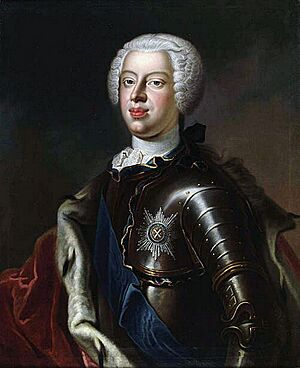Duke Anthony Ulrich of Brunswick facts for kids
Quick facts for kids Anthony Ulrich |
|
|---|---|
| Duke of Brunswick-Lüneburg | |

Portrait by an unknown painter, 1740
|
|
| Born | 28 August 1714 Bevern, Principality of Brunswick-Wolfenbüttel, Holy Roman Empire |
| Died | 4 May 1774 (aged 59) (O.S.) Kholmogory, Arkhangelogorod Governorate, Russian Empire |
| Spouse | Grand Duchess Anna Leopoldovna of Russia |
| Issue |
|
| House | House of Mecklenburg-Brunswick-Romanov |
| Father | Ferdinand Albert II, Duke of Brunswick-Lüneburg |
| Mother | Princess Antoinette of Brunswick-Wolfenbüttel |
Duke Anthony Ulrich of Brunswick-Lüneburg (born August 28, 1714 – died May 4, 1774) was a German prince and a military officer. He became a general in the Russian army. His life took an unexpected turn when he moved to Russia and became part of the royal family.
Contents
Life in Russia
Early Life and Marriage
Anthony Ulrich was the second son of Ferdinand Albert II, Duke of Brunswick-Lüneburg. His mother was Princess Antoinette of Brunswick-Wolfenbüttel. His aunt, Elizabeth, who was married to the Holy Roman Emperor, helped arrange his marriage. She wanted him to marry Duchess Elisabeth of Mecklenburg-Schwerin. She was also known as "Anna Leopoldovna." Anna was the granddaughter of Tsar Ivan V.
Anthony Ulrich moved to Russia in 1733. This was so he and Anna could get to know each other. They got married in 1739. This marriage was meant to make the families of Romanov (Russia) and Habsburg (Holy Roman Empire) stronger friends.
A Royal Turn of Events
In 1740, Anthony and Anna had a baby son named Ivan. When he was just a baby, Ivan became the Emperor of Russia. At first, a man named Duke Ernst Biron was chosen to rule for the young emperor. This role is called a regent.
However, rumors spread that Biron planned to send Anthony and Anna away. So, Anthony and Anna decided to act. They organized a secret plan to take power. This is called a coup. They succeeded, and Anna became the new regent for their son.
Imprisonment and Later Life
Not long after Anna became regent, another coup happened in 1741. The new Empress, Elizabeth, took over. She had Anthony Ulrich, his wife, and their children arrested. They were kept in prison for the rest of their lives.
Life in prison was very hard for the family. They often did not have many things they needed. They were mostly cut off from the outside world. Only a few servants were allowed to talk to them. A governor would visit them regularly to check on their health.
In 1762, Empress Elizabeth died. The new Empress, Catherine, offered Anthony Ulrich a chance to leave Russia. But there was a condition: he had to leave his children behind. Anthony Ulrich refused to leave his children. He lost his eyesight before he died in 1774. He was buried secretly. Soldiers were not allowed to tell anyone where he was buried. However, his coffin was decorated with silver.
Children's Release
In 1780, the children who were still alive were finally released from prison. They were put in the care of their aunt. She was the Danish queen dowager Juliana Maria of Brunswick-Wolfenbüttel. The children left Russia on June 30.
They moved to Jutland, a part of Denmark. They lived in a comfortable house there. It was like a house arrest, but they were well cared for. Their aunt Juliana looked after them. Empress Catherine paid for their expenses. Because they had lived as prisoners for so long, they were not used to being social. They had a small group of about 40 to 50 people with them. Most of them were Danish, except for a priest. The money Catherine gave them was paid until the last child died in 1807.
Family Members
Anthony Ulrich and Anna Leopoldovna had five children:
- Ivan VI (1740–1764) – He was Emperor from 1740 to 1741.
- Catherine Antonovna of Brunswick (1741–1807) – She was released to live in Denmark in 1780.
- Elizabeth Antonovna of Brunswick (1743–1782) – She was released to live in Denmark in 1780.
- Peter Antonovich of Brunswick (1745–1798) – He was released to live in Denmark in 1780.
- Alexei Antonovich of Brunswick (1746–1787) – He was released to live in Denmark in 1780.
 | Valerie Thomas |
 | Frederick McKinley Jones |
 | George Edward Alcorn Jr. |
 | Thomas Mensah |

